exec1
#include <stdio.h>
#include <unistd.h>
int main()
{
char *arglist[3];
arglist[0] = "ls";
arglist[1] = "-l";
arglist[2] = 0 ;//NULL
printf("* * * About to exec ls -l
");
execvp( "ls" , arglist );
printf("* * * ls is done. bye");//若执行成功,就无法返回,所以打印不出这句话
return 0;
}
execvp():会从PATH 环境变量所指的目录中查找符合参数file 的文件名,找到后便执行该文件,然后将第二个参数argv传给该欲执行的文件。
返回值:
如果执行成功则函数不会返回,执行失败则直接返回-1,失败原因存于errno中。
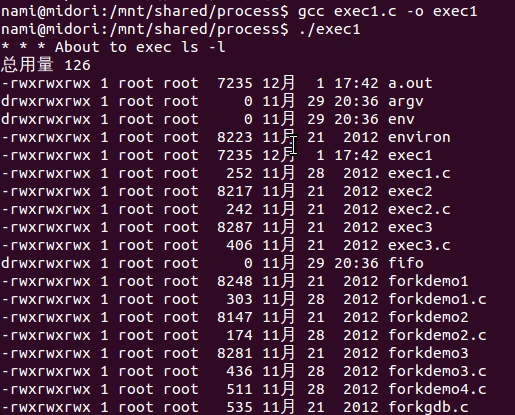
exec2
#include <stdio.h>
#include <unistd.h>
int main()
{
char *arglist[3];
arglist[0] = "ls";
arglist[1] = "-l";
arglist[2] = 0 ;
printf("* * * About to exec ls -l
");
execvp( arglist[0] , arglist );//这里将arglist[0]中的值作为执行文件。
printf("* * * ls is done. bye
");
}
和exec1,结果差不多
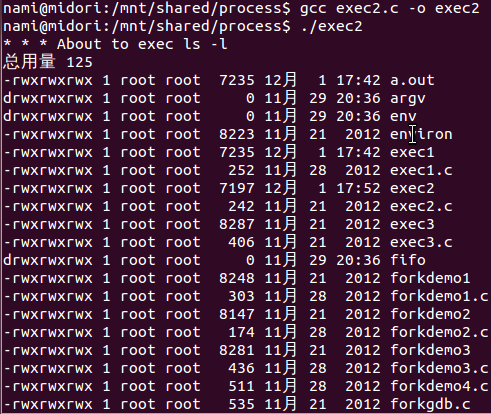
exec3
#include <stdio.h>
#include <unistd.h>
int main()
{
char *arglist[3];
char*myenv[3];
myenv[0] = "PATH=:/bin:";
myenv[1] = NULL;
arglist[0] = "ls";
arglist[1] = "-l";
arglist[2] = 0 ;
printf("* * * About to exec ls -l
");
// execv( "/bin/ls" , arglist );
// execvp( "ls" , arglist );
// execvpe("ls" , arglist, myenv);
execlp("ls", "ls", "-l", NULL);
printf("* * * ls is done. bye
");
}
函数说明:
execlp()会从PATH 环境变量所指的目录中查找符合参数file的文件名,找到后便执行该文件,然后将第二个以后的参数当做该文件的argv[0]、argv[1]……,最后一个参数必须用空指针(NULL)作结束。如果用常数0来表示一个空指针,则必须将它强制转换为一个字符指针,否则将它解释为整形参数,如果一个整形数的长度与char * 的长度不同,那么exec函数的实际参数就将出错。如果函数调用成功,进程自己的执行代码就会变成加载程序的代码,execlp()后边的代码也就不会执行了.
返回值:
如果执行成功则函数不会返回,执行失败则直接返回-1,失败原因存于errno 中。
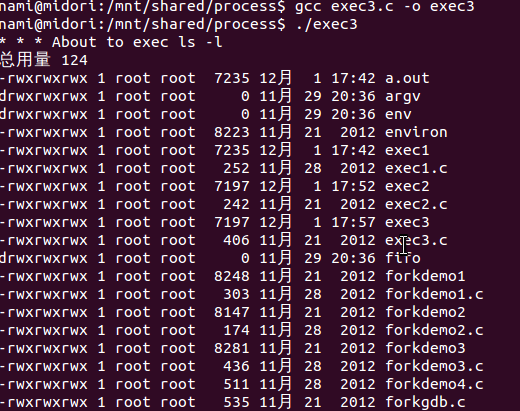
forkdemo1
#include <stdio.h>
#include<sys/types.h>
#include<unistd.h>
int main()
{
int ret_from_fork, mypid;
mypid = getpid();//取得进程识别码
printf("Before: my pid is %d
", mypid);//打印进程pid
ret_from_fork = fork();//产生子进程
sleep(1);//休眠1秒
printf("After: my pid is %d, fork() said %d
",//打印
getpid(), ret_from_fork);
return 0;
}
*Sleep()单位为毫秒,sleep()单位为秒(如果需要更精确可以用usleep单位为微秒)
这里返回两次!

forkdemo2
#include <stdio.h>
#include <unistd.h>
int main()
{
printf("before:my pid is %d
", getpid() );
fork();
fork();
printf("aftre:my pid is %d
", getpid() );
return 0;
}
这里使用了两个fork,那么就会有2^2个返回。

forkdemo3
#include <stdio.h>
#include<stdlib.h>
#include<unistd.h>
int main()
{
int fork_rv;
printf("Before: my pid is %d
", getpid());
fork_rv = fork(); /* create new process */
if ( fork_rv == -1 ) /* check for error */
perror("fork");
else if ( fork_rv == 0 ){ //利用pid来判断是否是子进程
printf("I am the child. my pid=%d
", getpid());
exit(0);
}
else{
printf("I am the parent. my child is %d
", fork_rv);
exit(0);
}
return 0;
}

forkdemo4
#include <stdio.h>
#include<stdlib.h>
#include<unistd.h>
int main()
{
int fork_rv;
printf("Before: my pid is %d
", getpid());
fork_rv = fork(); /* create new process */
if ( fork_rv == -1 ) /* check for error */
perror("fork");
else if ( fork_rv == 0 ){
printf("I am the child. my pid=%d
", getpid());
printf("parent pid= %d, my pid=%d
", getppid(), getpid());
exit(0);
}
else{
printf("I am the parent. my child is %d
", fork_rv);
sleep(10);
exit(0);
}
return 0;
}

forkgdb
#include <stdio.h>
#include <stdlib.h>
#include <unistd.h>
int gi=0;
int main()
{
int li=0;
static int si=0;
int i=0;
pid_t pid = fork();
if(pid == -1){
exit(-1);
}
else if(pid == 0){
for(i=0; i<5; i++){
printf("child li:%d
", li++);
sleep(1);
printf("child gi:%d
", gi++);
printf("child si:%d
", si++);
}
exit(0);
}
else{
for(i=0; i<5; i++){
printf("parent li:%d
", li++);
printf("parent gi:%d
", gi++);
sleep(1);
printf("parent si:%d
", si++);
}
exit(0);
}
return 0;
}
这个效果是并发带来的。当parent打印两个之后休息1秒,这时候child开始打印,打印一个之后,开始休息,这时刻parent可以开始打印了,打印一轮(si第一次gi,li第二次)后,又遇到sleep,再次跑child……造成了这种现象。
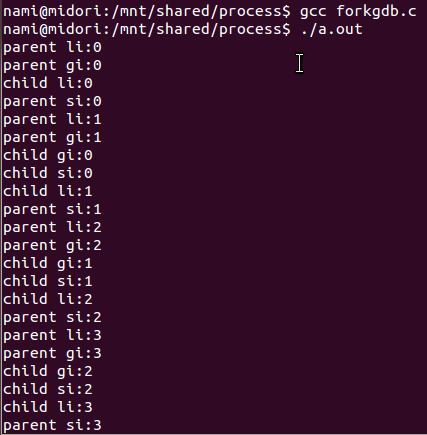
psh1
#include <stdio.h>
#include <stdlib.h>
#include <string.h>
#include<unistd.h>
#define MAXARGS 20
#define ARGLEN 100
int execute( char *arglist[] )
{
execvp(arglist[0], arglist);
perror("execvp failed");
exit(1);
}
char * makestring( char *buf )
{
char *cp;
buf[strlen(buf)-1] = '�';
cp = malloc( strlen(buf)+1 );
if ( cp == NULL ){
fprintf(stderr,"no memory
");
exit(1);
}
strcpy(cp, buf);
return cp;
}
int main()
{
char *arglist[MAXARGS+1];
int numargs;
char argbuf[ARGLEN];
numargs = 0;
while ( numargs < MAXARGS )
{
printf("Arg[%d]? ", numargs);
if ( fgets(argbuf, ARGLEN, stdin) && *argbuf != '
' )
arglist[numargs++] = makestring(argbuf);
else
{
if ( numargs > 0 ){
arglist[numargs]=NULL;
execute( arglist );
numargs = 0;
}
}
}
return 0;
}
执行输入的命令,空参数返回

psh2
#include <stdio.h>
#include<stdlib.h>
#include<string.h>
#include<sys/types.h>
#include<sys/wait.h>
#include<unistd.h>
#include <signal.h>
#define MAXARGS 20
#define ARGLEN 100
char *makestring( char *buf )
{
char *cp;
buf[strlen(buf)-1] = '�';
cp = malloc( strlen(buf)+1 );
if ( cp == NULL ){
fprintf(stderr,"no memory
");
exit(1);
}
strcpy(cp, buf);
return cp;
}
void execute( char *arglist[] )
{
int pid,exitstatus;
pid = fork();
switch( pid ){
case -1:
perror("fork failed");
exit(1);
case 0:
execvp(arglist[0], arglist);
perror("execvp failed");
exit(1);
default:
while( wait(&exitstatus) != pid )
;
printf("child exited with status %d,%d
",
exitstatus>>8, exitstatus&0377);
}
}
int main()
{
char *arglist[MAXARGS+1];
int numargs;
char argbuf[ARGLEN];
numargs = 0;
while ( numargs < MAXARGS )
{
printf("Arg[%d]? ", numargs);
if ( fgets(argbuf, ARGLEN, stdin) && *argbuf != '
' )
arglist[numargs++] = makestring(argbuf);
else
{
if ( numargs > 0 ){
arglist[numargs]=NULL;
execute( arglist );
numargs = 0;
}
}
}
return 0;
}
上一个函数的循环模式,并在成功执行一次后,并显示当前函数调用的子程序一个什么状态= =
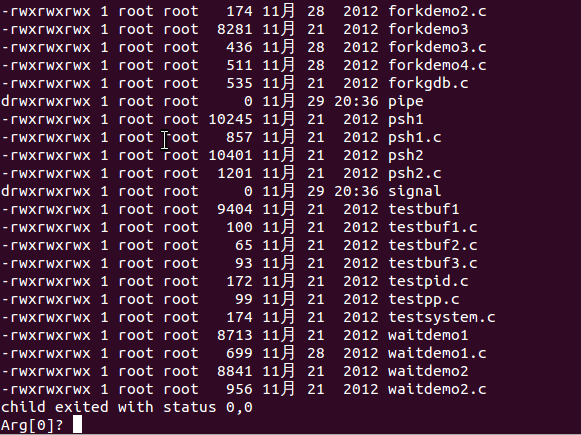
testbuf1
#include <stdio.h>
#include <stdlib.h>
int main()
{
printf("hello");
fflush(stdout);
while(1);
}
打印一个hello,还不让我退出

testbuf2
#include <stdio.h>
int main()
{
printf("hello
");
while(1);
}
打印一个hello�,还不让我退出

testbuf3
#include <stdio.h>
int main()
{
fprintf(stdout, "1234", 5);
fprintf(stderr, "abcd", 4);
}
打印一个1234abcd

testpid
#include <stdio.h>
#include <unistd.h>
#include <sys/types.h>
int main()
{
printf("my pid: %d
", getpid());
printf("my parent's pid: %d
", getppid());
return 0;
}
打印一个进程和他的父进程的pid

testpp
#include <stdio.h>
#include <stdlib.h>
int main()
{
char **pp;
pp[0] = malloc(20);//pp[0]就是*pp
return 0;
}
访问的内存超出了系统所给这个程序的内存空间

testsystem
#include <stdlib.h>
int main ( int argc, char *argv[] )
{
system(argv[1]);
system(argv[2]);
return EXIT_SUCCESS;
} /* ---------- end of function main ---------- */
system()—执行shell命令也就是像dos发送一条指令
函数说明:
system()会调用fork()产生子进程, 由子进程来调用/bin/sh-c string 来执行参数string 字符串所代表的命令, 此命令执行完后随即返回原调用的进程. 在调用system()期间SIGCHLD 信号会被暂时搁置,SIGINT 和SIGQUIT 信号则会被忽略.
返回值:
1、如果 system()在调用/bin/sh 时失败则返回127, 其他失败原因返回-1.。
2、若参数string 为空指针(NULL), 则返回非零值.
3、如果system()调用成功则最后会返回执行shell 命令后的返回值, 但是此返回值也有可能为system()调用/bin/sh 失败所返回的127, 因此最好能再检查errno 来确认执行成功.
这就是同时执行两个指令

waitdemo1
#include <stdio.h>
#include<stdlib.h>
#include<sys/types.h>
#include<sys/wait.h>
#include<unistd.h>
#define DELAY 4
void child_code(int delay)
{
printf("child %d here. will sleep for %d seconds
", getpid(), delay);
sleep(delay);
printf("child done. about to exit
");
exit(17);
}
void parent_code(int childpid)
{
int wait_rv=0; /* return value from wait() */
wait_rv = wait(NULL);
printf("done waiting for %d. Wait returned: %d
",
childpid, wait_rv);
}
int main()
{
int newpid;
printf("before: mypid is %d
", getpid());
if ( (newpid = fork()) == -1 )
perror("fork");
else if ( newpid == 0 )
child_code(DELAY);
else
parent_code(newpid);
return 0;
}

waitdemo2
#include <stdio.h>
#include<stdlib.h>
#include<sys/types.h>
#include<sys/wait.h>
#include<unistd.h>
#define DELAY 10
void child_code(int delay)
{
printf("child %d here. will sleep for %d seconds
", getpid(), delay);
sleep(delay);
printf("child done. about to exit
");
exit(27);
}
void parent_code(int childpid)
{
int wait_rv;
int child_status;
int high_8, low_7, bit_7;
wait_rv = wait(&child_status);
printf("done waiting for %d. Wait returned: %d
", childpid, wait_rv);
high_8 = child_status >> 8; /* 1111 1111 0000 0000 */
low_7 = child_status & 0x7F; /* 0000 0000 0111 1111 */
bit_7 = child_status & 0x80; /* 0000 0000 1000 0000 */
printf("status: exit=%d, sig=%d, core=%d
", high_8, low_7, bit_7);
}
int main()
{
int newpid;
printf("before: mypid is %d
", getpid());
if ( (newpid = fork()) == -1 )
perror("fork");
else if ( newpid == 0 )
child_code(DELAY);
else
parent_code(newpid);
}

参考资料:
1、关于函数execvp
2.关于函数 execlp
3.system